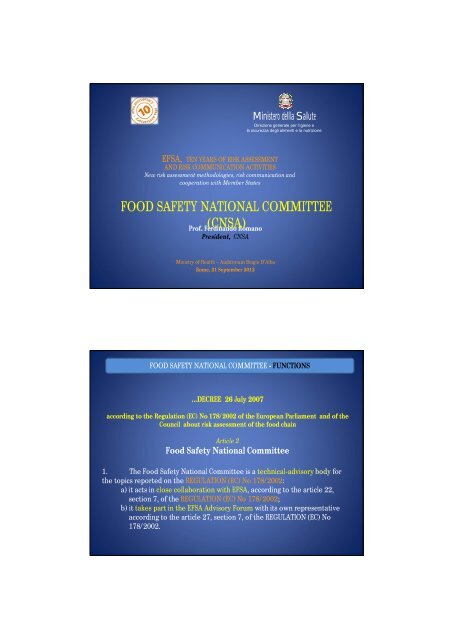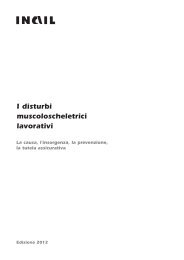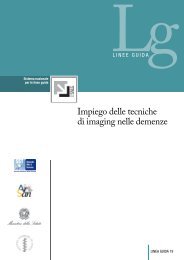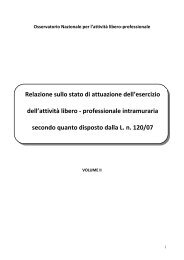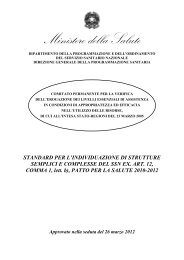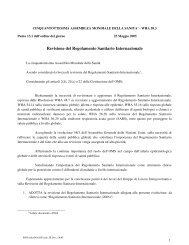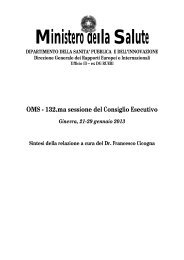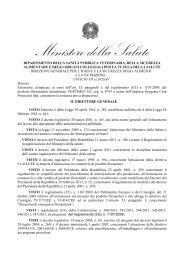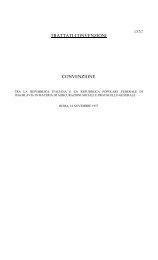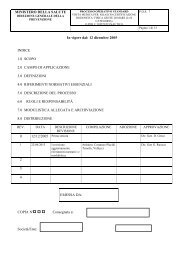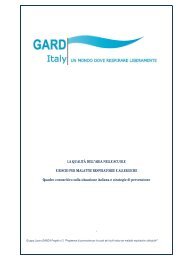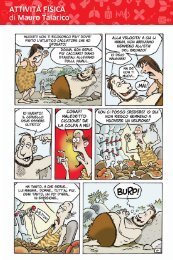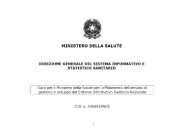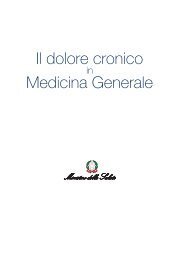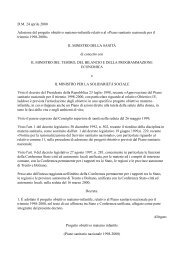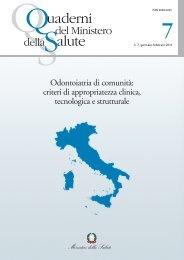food safety national committee (cnsa) - Ministero della Salute
food safety national committee (cnsa) - Ministero della Salute
food safety national committee (cnsa) - Ministero della Salute
Create successful ePaper yourself
Turn your PDF publications into a flip-book with our unique Google optimized e-Paper software.
EFSA, TEN YEARS OF RISK ASSESSMENT<br />
AND RISK COMMUNICATION ACTIVITIES<br />
New risk assessment methodologies, risk communication and<br />
cooperation with Member States<br />
Prof. Ferdinando Romano<br />
President, CNSA<br />
Ministry of Health – Auditorium Biagio D’Alba<br />
Rome, 21 September 2012<br />
<strong>Ministero</strong> <strong>della</strong> <strong>Salute</strong><br />
Direzione generale per l’igiene e<br />
la sicurezza degli alimenti e la nutrizione<br />
FOOD SAFETY NATIONAL COMMITTEE<br />
(CNSA)<br />
FOOD SAFETY NATIONAL COMMITTEE - FUNCTIONS<br />
…DECREE 26 July 2007<br />
according to the Regulation (EC) No 178/2002 of the European Parliament and of the<br />
Council about risk assessment of the <strong>food</strong> chain<br />
Article 2<br />
Food Safety National Committee<br />
1. The Food Safety National Committee is a technical-advisory body for<br />
the topics reported on the REGULATION (EC) No 178/2002:<br />
a) it acts in close collaboration with EFSA, according to the article 22,<br />
section 7, of the REGULATION (EC) No 178/2002;<br />
b) it takes part in the EFSA Advisory Forum with its own representative<br />
according to the article 27, section 7, of the REGULATION (EC) No<br />
178/2002.
EFSA - MISSION<br />
REGULATION (EC) No 178/2002 OF THE EUROPEAN PARLIAMENT<br />
AND THE COUNCIL of 28 January2002<br />
laying down the general principles and requirements of <strong>food</strong> law,<br />
establishing the European Food Safety Authority and laying down procedures<br />
in matters of <strong>food</strong> <strong>safety</strong><br />
Article 22<br />
Mission of the Authority<br />
7. The Authority shall carry out its tasks in conditions which enable it to serve as a<br />
point of reference by virtue of its independence, the scientific and technical quality of<br />
the opinions it issues and the information it disseminates, the transparency<br />
of its procedures and methods of operation, and its diligence in performing the tasks<br />
assigned to it.<br />
It shall act in close cooperation with the competent bodies in the Member States<br />
carrying out similar tasks to these of the Authority<br />
…………………………..<br />
EFSA – ADVISORY FORUM<br />
REGULATION (EC) No 178/2002 OF THE EUROPEAN PARLIAMENT<br />
AND THE COUNCIL of 28 January2002<br />
laying down the general principles and requirements of <strong>food</strong> law,<br />
establishing the European Food Safety Authority and laying down procedures<br />
in matters of <strong>food</strong> <strong>safety</strong><br />
Article 27<br />
Advisory Forum<br />
1. The Advisory Forum shall be composed of representatives from competent bodies<br />
in the Member States which undertake tasks similar to those of the Authority, on the<br />
basis of one representative designated by each Member State. Representatives may<br />
be replaced by alternates, appointed at the same time.<br />
…………………………..
MINISTRY OF HEALTH - ORGANIZATION<br />
Department of Veterinary Public Health, Food Safety and Collegial Bodies for Health<br />
Protection<br />
Directorate General of Collegial Bodies for Health Protection<br />
The Directorate General of Collegial Bodies for Health Protection, identified as the<br />
competent Italian authority for the European Food Safety Authority (EFSA),<br />
performs functions related to the following:<br />
• physical, chemical and biological risk assessment in <strong>food</strong><br />
<strong>safety</strong><br />
• Supports the Food Safety National Committee activities<br />
• ensures a link with the regions also in relation to planning<br />
risk assessment activities and the operation of the Forum of<br />
consumer and producer associations<br />
……………………………………<br />
MINISTRY OF HEALTH<br />
Strategic Advisory Committee<br />
Food Safety National Committee
FOOD SAFETY NATIONAL COMMITTEE - TASKS<br />
…DECREE 26 July 2007<br />
according to the Regulation (EC) No 178/2002 of the European Parliament and of the Council about risk<br />
assessment of the <strong>food</strong> chain<br />
Article 2<br />
Food Safety National Committee<br />
…………………………..<br />
2. It provides scientific and technical support on <strong>food</strong> <strong>safety</strong> to<br />
the Administrations working on risk management in <strong>food</strong><br />
<strong>safety</strong><br />
3. It provides scientific opinions at the request of the Strategic<br />
Advisory Committee, of the Central State Administrations and of<br />
the Regions<br />
FOOD SAFETY NATIONAL COMMITTEE– COMPOSITION<br />
…DECREE 26 July 2007<br />
according to the Regulation (EC) No 178/2002 of the European Parliament and of the Council about risk<br />
assessment of the <strong>food</strong> chain<br />
Article 2<br />
Food Safety National Committee<br />
…………………………..<br />
4. … is composed of 18 members with specific expertise in the following topics:<br />
a) <strong>food</strong> additives, flavourings, processing aids and materials in contact with <strong>food</strong>;<br />
b) additives and products or substances used in animal feed;<br />
c) plant health, plant protection products and their residues;<br />
d) genetically modified organisms;<br />
e) dietetic products, nutrition and allergies;<br />
f) biological hazards;<br />
g) contaminants in the <strong>food</strong> chain;<br />
h) animal health and welfare.
FOOD SAFETY NATIONAL COMMITTEE – COMPOSITION<br />
…DECREE 26 July 2007<br />
Organization of the functions according to the Regulation (EC) No 178/2002 of the European Parliament and<br />
of the Council about risk assessment of the <strong>food</strong> chain<br />
Article 2<br />
Food Safety National Committee<br />
…………………………..<br />
8. The Committee may appoint further independent<br />
scientific experts on specific issues under evaluation, through<br />
setting ad hoc workgroups.<br />
FOOD SAFETY NATIONAL COMMITTEE – CONFLICT OF INTEREST<br />
…DECREE 26 July 2007<br />
Organization of the functions according to the Regulation (EC) No 178/2002 of the European Parliament and<br />
of the Council about risk assessment of the <strong>food</strong> chain<br />
Article 2<br />
Food Safety National Committee<br />
…………………………..<br />
9. For the members of the Committee it is mandatory to deliver<br />
scientific advice in the public interest independently of any<br />
external influence.<br />
For this purpose, they have to declare any conflicts of interest<br />
that may be considered prejudicial to their independence.
STRATEGIC ADVISORY COMMITTEE - TASKS<br />
…DECREE 26 July 2007<br />
Organization of the functions according to the Regulation (EC) No 178/2002 of the European Parliament and<br />
of the Council about risk assessment of the <strong>food</strong> chain<br />
Article 3<br />
Strategic Advisory Committee<br />
……………………..<br />
1. The Strategic Advisory Committee performes the following tasks within the risk<br />
assessment of the <strong>food</strong> chain:<br />
a) it defines the programme of activities on a pluriannual basis;<br />
b) it defines the priorities for the actions<br />
c) It defines the communication policy<br />
2. In order to comply with the above, the Committee takes into account also the<br />
problems rised by the Forum of the Consumers and Producers Associations<br />
STRATEGIC ADVISORY COMMITTEE – COMPOSITION<br />
…DECREE 26 July 2007<br />
Organization of the functions according to the Regulation (EC) No 178/2002 of the European Parliament and<br />
of the Council about risk assessment of the <strong>food</strong> chain<br />
Article 3<br />
Strategic Advisory Committee<br />
……………………..<br />
1. … is composed of:<br />
a) the Minister of Health, or her/his delegate, as President<br />
b) the Minister of Agricolture, Food and Forestry Policies or her/his delegate<br />
c) the Coordinator of the Regional Assessors responsible for Health<br />
d) the Coordinator of the Regional Assessors responsible for Agricolture<br />
e) the Head of the Department of Veterinary Public Health, Food Safety and Collegial Bodies for Health,<br />
Ministry of Health<br />
f) the Head of the Department of Development Policies, Ministry of Agricolture, Food and Forestry Policies<br />
g) the Director of the National Secretariat for Risk Assessment of the Food Chain<br />
h) three technical representatives of the Regions, appointed by the Assembly of the Regions<br />
i) the President of the National Health Institute<br />
j) the President of the National Institute for Research on Food and Nutrition<br />
k) the President of the Food Safety National Committee<br />
l) one member of the Food Safety National Committee, appointed by by the Minister of Health and the<br />
Minister of Agricolture, Food and Forestry Policies<br />
m) one representative of the Experimental Zooprophylactic Institutes, appointed by the Minister of Health.
FOOD SAFETY NATIONAL COMMITTEE – MEMBERS<br />
PROF. FERDINANDO ROMANO<br />
Dr. LEONELLO ATTIAS<br />
Prof. LUCIANA AVIGLIANO<br />
Prof. BARTOLOMEO BIOLATTI<br />
Prof. GAETANO CREPALDI<br />
Prof. MARIA LUISA CORTESI<br />
Dr. AMLETO D’AMICIS<br />
Prof ADRIANA IANIERI<br />
Dr. ALBERTO MANTOVANI<br />
Start on 15 September 2011<br />
Prof. AUGUSTO PANA’<br />
Prof. GIAMPAOLO PECCOLO<br />
Prof. GIANFRANCO PIVA<br />
Prof. GIORGIO POLI<br />
Dr. ANTONIA RICCI<br />
Prof. GIORGIO RONDINI<br />
Prof. GIUSEPPE ROTILIO<br />
Prof. MARCELLO TICCA<br />
Prof. GIAN VINCENZO ZUCCOTTI<br />
(independent scientific experts)<br />
COMITATO NAZIONALE SICUREZZA ALIMENTARE – INTERNAL REGULATION<br />
Internal Regulation<br />
Article 7<br />
(Procedures for the release of Scientific Opinions)<br />
�define the question<br />
�study objectives<br />
�information sources<br />
�available data description<br />
�evaluation of data quality<br />
�selection of the eligible data<br />
�data analysis<br />
�Interpretation of the results<br />
�Scientific opinion<br />
Methodology
FOOD SAFETY NATIONAL COMMITTEE – DOCUMENTS<br />
� Scientific opinion on Energy drinks<br />
� Scientific opinion on Food allergies and consumer<br />
<strong>safety</strong><br />
� Scientific opinion on Transmissible spongiform<br />
encephalopathies (TSEs) in sheep and goats<br />
� Scientific opinion on Modernization of swine meat<br />
inspection<br />
FOOD SAFETY NATIONAL COMMITTEE – ENERGY DRINKS<br />
Energy drinks – issues related to <strong>safety</strong> and accurate<br />
information to consumers<br />
“Considerando la mole dei dati disponibili e i limiti dell’attuale<br />
legislazione, è necessario intervenire, in particolar modo<br />
rivolgendosi in maniera diretta, comprensibile e specifica al<br />
giovane consumatore. E’ pertanto fondamentale poter garantire<br />
l’ampia diffusione e l’accesso ad informazioni dettagliate e<br />
chiare relativamente all’esistenza, alla tipologia e alla potenziale<br />
severità degli effetti negativi del consumo associato di EDs ed<br />
alcol. E’ inoltre necessario contrastare, con opportuni strumenti<br />
normativi, l’eventuale diffusione anche in Italia di EDs alcolici<br />
acquistabili anche online, in particolare nelle fasce di popolazione<br />
più deboli, come nel caso degli adolescenti.”
FOOD SAFETY NATIONAL COMMITTEE – TSE<br />
� Risk of exposure to PrPSC in the case of adopting derogations from Reg.<br />
(CE) 727/2007<br />
� Risk of disease related to consumption of sheep and goat meat coming<br />
from farms with cases of TSE<br />
…RITIENE<br />
che, in applicazione delle deroghe previste dal regolamento CE<br />
727/2007, il rischio di esposizione del consumatore a seguito<br />
dell’assunzione di carni provenienti da animali sensibili alla malattia<br />
o da focolai di encefalopatia spongiforme trasmissibile (EST ) possa<br />
definirsi accettabile; in mancanza di evidenza scientifica che<br />
dimostri la trasmissione di EST all’uomo il rischio di contrarre la<br />
malattia è da considerarsi trascurabile e quindi accettabile;<br />
AUSPICA<br />
un incremento dei piani di selezione genetica di animali resistenti già<br />
previsti dall’attuale normativa;<br />
FOOD SAFETY NATIONAL COMMITTEE – MEAT INSPECTION<br />
Modernization of swine meat inspection<br />
(EFSA Scientific Opinion on the public health hazards to be covered by inspection of<br />
meat (swine) n. 2351 adopted on 31 August 2011<br />
…RITIENE<br />
che allo stato attuale, in considerazione delle diverse tipologie di allevamento e<br />
macellazione del suino in Italia e <strong>della</strong> difficoltà di estrapolazione ed aggregazione dei<br />
dati raccolti dall’attuale sistema e relativi esiti dell’ispezione ante e post-mortem, non<br />
risulti possibile escludere che l’eventuale modifica <strong>della</strong> normativa comunitaria<br />
sull’ispezione delle carni suine aumenti i rischi per il consumatore;<br />
AUSPICA<br />
la realizzazione di progetti pilota da parte <strong>della</strong> Direzione generale per l’igiene, la<br />
sicurezza alimentare e la nutrizione e <strong>della</strong> Direzione generale <strong>della</strong> sanità animale e dei<br />
farmaci veterinari, volti ad acquisire, relativamente ai due modelli produttivi, i dati<br />
necessari per motivare ed orientare la posizione dell’Italia;
THANK YOU FOR YOUR<br />
ATTENTION …


